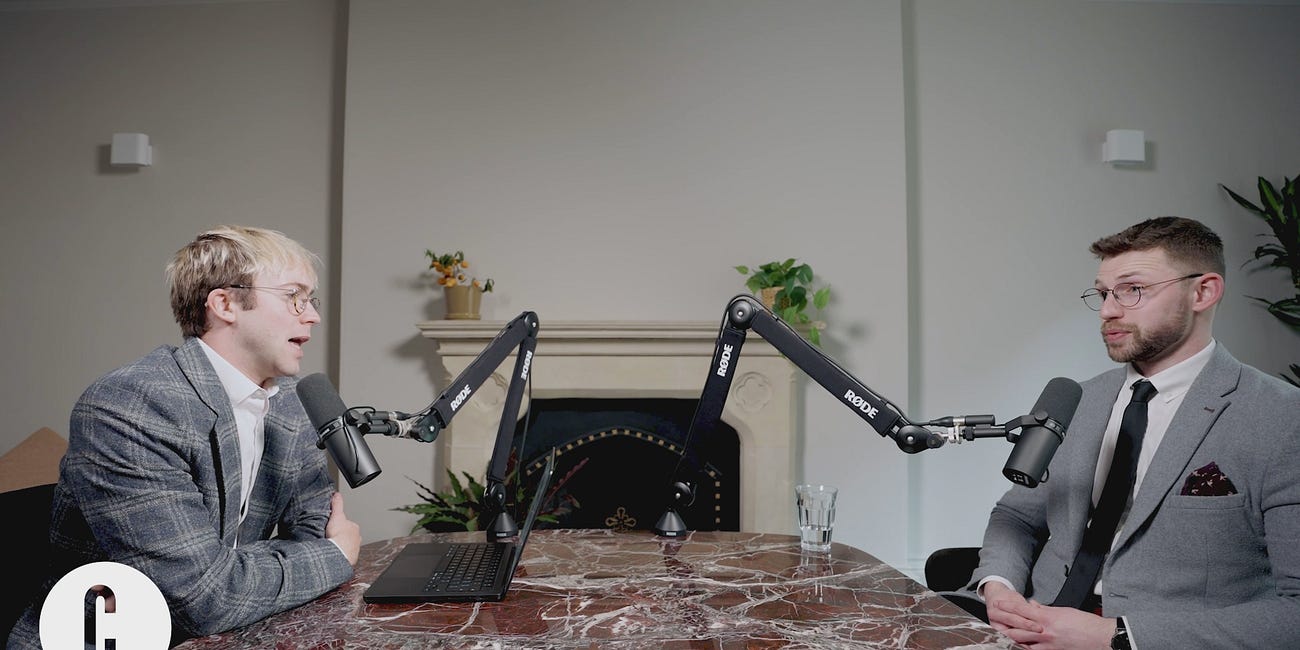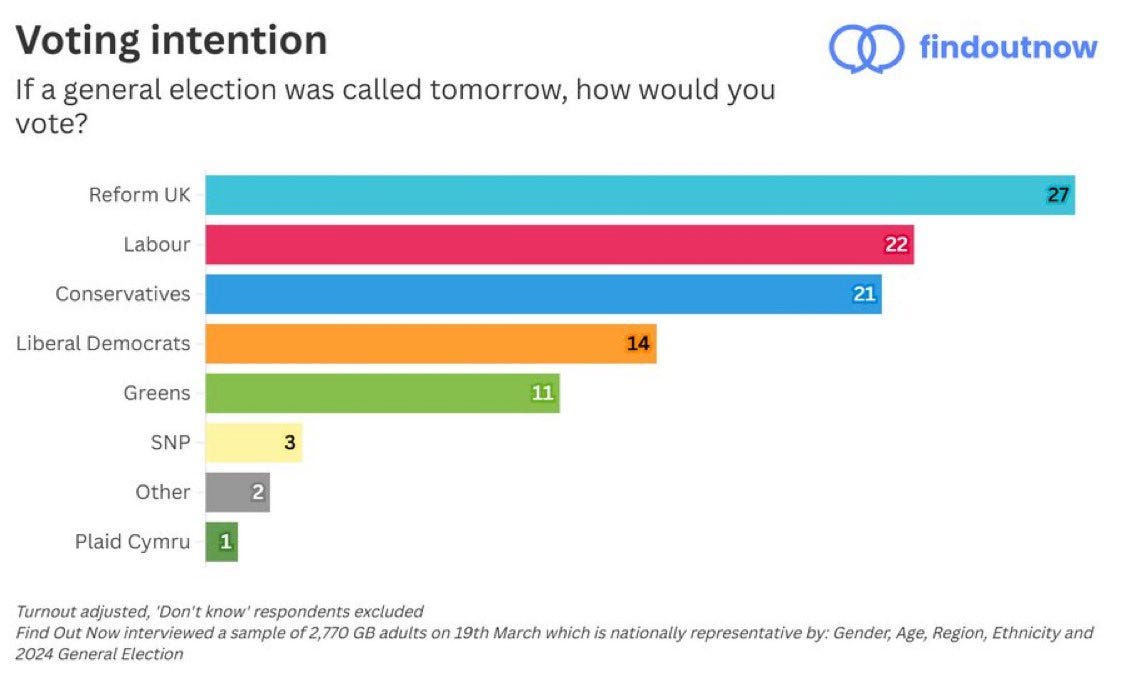After last week’s detailed discussion of the ongoing debacle involving Reform UK and exiled MP Rupert Lowe, we began the latest Weekly Wrap with a recap of the latest developments in this Westminster drama.
If you haven’t kept up to date with every detail, you can avail yourself of those with the clip below:
Why Reform's Attack on Rupert Lowe Failed
This past Saturday was the 15th of March: the infamous Ides of March, when, in 44 BC, Julius Caesar was betrayed and assassinated by Rome’s Senators. They feared the celebrated dictator would reconstitute Rome’s republic into a monarchy, and so cut the tall poppy down before he outgrew them.
Last Monday, the 17th of March, Nigel Farage announced this week that twenty-nine councillors have defected to Reform UK — including Conservatives, a Liberal Democrat, a lifelong socialist, and a Bangladeshi nationalist. Not quite the British patriots that Reform's core supporters had in mind.
At the press conference, Farge said that chairman Zia Yusuf had been subjected to racist abuse since he called the police on Rupert Lowe for alleged “threats” made almost four months earlier, in December 2024. Given the source of this abuse is presumably from disillusioned Reform supporters, who object to Rupert Lowe’s treatment, this coded as Farage condemning his own voters.
Farage then accused the media of refusing to cover the abuse — in effect, inviting them to yet again call those who support Reform racists.
“But I do want to say one thing: some of the online abuse and, frankly, outright overt racism that has been showed against a senior member of this party — had it been shown towards any other member of the ethnic minorities from the Labor and Conservative parties, every one of you in the journalistic arena in this room would have been in total and absolute uproar. It would have been a major national story. But because it's happening to us, no one seems to really care — with the honorable exception of Danny Finkelstein in The Times. I've never really agreed with anything in the past Danny's ever written; but on this, he showed himself to be fair and to be decent. Anyway, we are big enough and ugly enough to take it…”
The problem is not that Farage condemned racist comments — as any of us would. The problem is that, by only paying attention to a minority of online racists, Farage is neglecting to address the substantive criticisms of his and Yusuf’s conduct over the expulsion of Rupert Lowe, and concerns that supporters have over the perceived softening of the party on immigration and Islam in the name of “professionalising the party.”
These concerns are very real, and pitched as a sensible political strategy by former UKIP, Brexit Party, and Reform comms strategist Gawain Towler:
“Reform won 4.1 million votes at the last election. To win a general election, you need 10 [million], 10 [million] plus, and if you're sitting on a sofa there's a maybe a couple of hundred thousand votes down the right hand side, if you're looking down to find the coins, but in the middle, that's where you find the 6 million. If we want to win and change Britain for the better, we've got to be looking behind those cushions there, because that gets you nowhere, and you will turn off a lot of people who you need to attract. Farage wants to win. Rupert wants to be pure. I made some comment the other day in an article, where I feel Rupert has become almost like a Corbynista: making the perfect the enemy of the good and so that that leftwing, “We've got to be pure pure blood socialists…” and of course that's not going to win you a general election … [Rupert is] more purist, and that's great — but not if you want to win an election. That's the bottom line.”
The problem is two-fold:
We already know that a majority of the country support Rupert Lowe’s, not Nigel Farage’s, position on mass deportations for foreign criminals and illegal immigrants.
The media which Farage and his allies are appealing to do not want Reform to win — and so have every incentive to rig the rules of the political game so that they are tripped up anytime they try to abide by the principles their supporters want them to stand for, and have to soften on the express purpose of their party if they want to avoid being called slanderous things like “Racist” by their enemies.
To concede that one’s own supporters are something to distance yourself from makes Reform appear like a party ready to bare its neck for its enemies in rival parties and their allies in the establishment media.
This was undeniably the motivator for Rupert Lowe’s banishment from Reform UK. As leaked WhatsApp messages between Farage and a Reform activist show, Lowe was removed from the party “Because he is damaging the party just before elections. Disgusting.”
One can only assume that the damages allegedly wrought by Rupert upon Reform were:
His perceived criticism of Nigel Farage’s leadership in his Daily Mail interview with Andrew Pierce.
Rupert calling for mass deportations — which Farage denounced as “a very grave, dark and dangerous use of language.”
It appears, though, that none of these controversies have affected Reform in the polling — making this entire scandal an avoidable battle which has split the national populist right, on behalf of a Uniparty and media establishment which would like nothing more than to see Reform capsize.
As I explain in the summary in The Weekly Wrap, the reason the press is not amenable to Reform’s claims of racist abuse is because they are not principally committed to eradicating racism in all its forms — but rather, use racism as a moral cudgel to beat their political enemies into submission.
Either they render you so radioactive with false charges of bigotry, in the hopes that no voter will touch you with a barge pole; or they bludgeon you so effectively that you conform to their expectations in the hopes that they stop slandering you, and become indistinguishable from the other establishment liberal-progressive parties in the process.
The establishment contempt for Reform’s supporters is evident in the piece that both Towler and Farage referenced, by Danny Finkelstein, in The Times:
David Cameron once caused great offence among supporters of Ukip by describing that party as a bunch of “fruitcakes and loonies and closet racists, mostly”. Farage, understandably, made great play of this undiplomatic statement but, in reality, no one is more inclined to think it true than Farage himself.
One of Farage’s deepest beliefs is that he is surrounded by idiots, saved from political disaster and racist faux pas mainly by his own political savvy. He notes that one particularly dangerous form this idiocy takes is for some party rando to start believing that they, rather than he, should be leader. He observes, usually correctly, that his rival is comically lacking in political skills and was only there in the first place because of Farage’s own charismatic appeal. And he invariably acts against such people, however messy it gets.
However, the dispute between Lowe and Farage is not entirely about the former’s inflated ambitions and the latter’s prickly insecurity. If it was, it wouldn’t be anywhere near as serious as I think it will prove. There is politics in their personal tiff, the oldest of all party disputes — that between those who want to broaden a party and those who want to deepen it.
Farage’s sympathy for Cameron’s characterisation of Ukip is not the only ironic coincidence between their outlooks. Farage, like Cameron, is also a broadener against the deepeners. He is, if you like, a party moderniser.
A particular target, I am sure, will be Reform’s chairman, Zia Yusuf. Because he is clearly articulate and clever, and because he is a Muslim and has worked for Goldman Sachs, Yusuf is a symbol of the modernisation — the broadening — Farage believes essential. But, for the same reason, the deepeners want him gone. Wading through online comments about Yusuf’s ethnicity and commercial success is not an edifying experience.
It is noteworthy that no examples of “racist abuse” against Yusuf were cited or quoted by Farage or Finkelstein — meaning criticisms of Yusuf as a Muslim (a religion, not a race) in a position of seniority in a party whose supporters express concerns about the role of Islam in public life can be conflated with “racist abuse”.
Farage made a mistake by citing this piece because it sounds as if he is denouncing Rupert Lowe, anyone in Reform, and any of the voting public who agree with mass deportations or have reservations about Islam as racist. If he truly believes that, then that mistake may prove fatal for Reform’s long-term prospects of not just winning an election, but governing effectively.
Finkelstein also wrote: "because he is a Muslim and has worked for Goldman Sachs, Yusuf is a symbol of the modernisation — the broadening — Farage believes essential." So, choosing candidates and staff on the basis they worked for the same financial sector that was so Woke they invented ESGs and de-banked Farage, and because they are Muslim, is "essential" for Reform to win? This is bad advice, and not what Reform supporters want.
Some of Farage's closest allies then accused Rupert Lowe of being boosted by Indian bots — a claim for which they provided no evidence.
Rubbishing Lowe in the same way that Democrats in 2016, or Remainers like Carole Cadwalladr did to Leave.EU, with allegations of foreign interference, and finding Russian bots beneath every bed, is a bad look to one’s core supporters. In pursuing votes from those unlikely to ever vote for Reform, the party is estranging ambitious and competent talent who are vital not only for earning Reform new voters, but also for crafting and executing policies when in government.
and I discussed this recurrent culling of political talent around Farage with former UKIP leadership candidate and MEP, Steven Woolfe on Deprogrammed on The New Culture Forum:As I mentioned in the interview, I had previously warned that Farage is looking less like an Arthurian king of Britain’s unrepresented majority, amassing a Round Table of competent allies who can police the kingdom’s various fiefdoms, and rather like Lear, whose squabbling progeny will destabilise his rule.
Far from being the presumptive king of the British right, Farage looks more and more like Lear: alone in the wilderness, while his offspring squabble over who gets to inherit the crown. He complains about woke Jaguar adverts, while more pressing problems escape his attention. If he doesn’t exert authority, specifically on the issues his supporters look to him to address, then we will lose another five years to the Lib-Lab-Con consensus. Reform only stand to gain from being bolder. They should not be afraid to support policies such as the mass deportation of the over-a-million foreign criminals in Britain; or to oppose the long march of Islam through Britain’s laws and institutions. The BBC has called the countryside racist, so who cares if they throw the same slur at Reform too?
I say, as a critical friend of Reform UK: please, sort it out. The hour is too late for infighting and cowardice.
I hate to say that my warnings from November 2024 were right.
King John I neglected the barons of England, and levied penalties on his natural constituents, while pursuing Norman territory which he had no hope of recapturing. Those barons brought the Magna Carta forward at Runnymede in an effort to constrain John’s unstable rule. This act of rebellion was the foundation of the liberties that Englishmen felt entitled to exercise for almost a millennia, and it formed the spirit of our unwritten Constitution.
In this analogy, the unjust treatment of Rupert Lowe may be the British right’s “Magna Carta moment”: in which the neglected barons — think-tanks, alternative media ventures, influencers, street protest movements, and “Sofa Voters” principally concerned about cultural and demographic change — band together to present themselves as a parallel power base to the recalcitrant King.
We would all rather this not be necessary. But with men like Rupert Lowe, Ben Habib, and Steven Woolfe shut out of Reform UK, another entity to encompass the vast amount of talent that Reform have left on the table is likely to take shape.


















Share this post